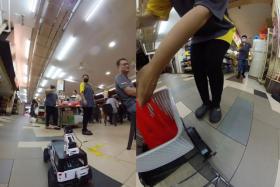Not enough local takers for tech jobs
Boom in ICT sector, but jobs go abegging because of skills mismatch among Singaporeans
Techies are in demand here.
Studies by recruitment firms show a spike in hiring activity in the information and communication technology (ICT) sector.
The Monster Employment Index, which tracks online job posting activities on a monthly basis, found a 25 per cent year-on-year growth in hiring activity for software, hardware and telecommunications jobs.
Recruitment firm Robert Walters spotted a 24 per cent rise in hiring activity for the IT job market for the second quarter of this year compared to the same period last year.
Still, Singapore is struggling to keep up with this booming sector, which has some 30,000 jobs to be filled by 2020, experts told The New Paper yesterday.
The problem lies in the mismatch of skills, said Minister for Manpower Lim Swee Say.
At the TechSkills Accelerator Career Services Day in October, he said: "Even if the jobseekers know what ICT jobs they want, they may not have the skills, expertise and experience needed.
"This applies to not just the newcomers, but also those with some years of ICT experience. The fast pace of technological change means many need to re-learn so as to remain in or re-enter the ICT sector."
The skills mismatch means the ICT jobs may be "shoes that are too big to fill" for those not equipped with the right skills, said Mr Erman Tan, president of Singapore Human Resource Institute.
People also tend to associate ICT jobs with long hours and low pay, said Mr Patrick Thng, an information systems senior lecturer at Singapore Management University (SMU).
With Singapore looking to countries such as India to plug the manpower gap, the influx of foreign workers has led to lower wages, causing local graduates to shun it.
Mr Thng said: "We haven't been producing enough students with some of these deep technical skills... Fewer people are attracted to these courses because the perception is that the hours are long, and the pay is not so good in such jobs."
But the situation is looking up, he said. At SMU, there is a heightened interest for the Information Systems undergraduate course.
"As students get to see successful start-ups - the Googles and Alibabas of the world - they get more excited about getting into innovation, ICT and start-ups," Mr Thng said.
For mid-career professionals looking for a change in the ICT sector, they can look to initiatives such as the place-and-train Professional Conversion Programme, which trains mid-career switchers to become ICT professionals.
Mr Tan suggested those seeking ICT jobs talk to someone in the sector.
"Understand the pros and cons of the trade, and what to expect, and be mentally prepared for the new challenges.
"As long as they have the willpower and the right mindset, they will be able to turn those challenges into something positive," he said.
Get The New Paper on your phone with the free TNP app. Download from the Apple App Store or Google Play Store now



